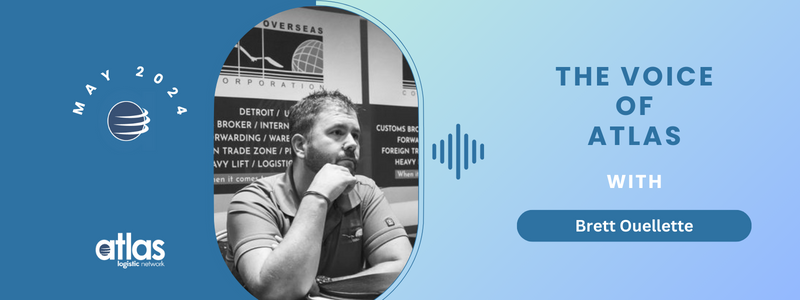For this week’s interview, we sat down with Brett Ouellette from Detroit, United States. He talked to us about their seamless transition to a remote workplace during the pandemic and the difficulties domestic logistics agents faced in the US.
How did you get started in the logistics industry and what has your journey been like so far?
I have been involved in logistics for the better part of my life. Generations of my Family have been involved in logistics for decades, so I started off working in container yards picking up trash when my father would take me to work. Or in 2002, when I was painting areas inside of warehouses, charging stations and distribution hubs in safety yellow to ensure the safety of staff working at those facilities.
When I was still in college, I worked midnights at a large furniture manufacturer. My main responsibility was loading outbound trucks for delivery on the midnight shift. I worked full-time throughout college, which I believe better prepared myself for the challenges which were upcoming upon graduation.
When I started college, I didn’t have a single thought about going into the logistics field. However, as I continued my schooling, I found myself slowly navigating back towards logistics and I have no regrets about that decision.
I work in an industry with many hard-working folks that dedicate themselves daily to their profession. I have had the opportunity to establish friendships with those I have worked and visited with for years throughout the world. This industry challenges you daily as a professional, especially throughout all the issues surrounding Covid-19. I truly believe it is due to those dedicated folks within this Logistics Atlas/Alfa Family which has allowed the world to continue to function in a normal state of day to day life.
How did you experience the COVID-19 pandemic and how did you adapt your daily operations?
The crisis required operations to show their versatility and flexibility when experiencing the issues of transferring to a hybrid remote working environment. The investments by our organization in its IT infrastructure allowed all but seamless transition to a hybrid remote working environment. These investments allowed our team to continue to service our partners and customers to the best of our ability.
If you could change one thing about the logistics industry, what would it be?
Well one problem, at least domestically in the US is holding companies accountable for lack of communication and not charging for storage on cargo when the customer doesn’t even have the ability to get access to recover the cargo. We have had countless frustrated customers over the last two years complain about the SSL or rail carriers charging storage for containers stuck on rail cars as they don’t have the ability to offload it.
What do you like about being a freight forwarder?
There is always a new and different challenge when you walk into the office every day. If it were repetitive, I do believe I would get bored of it very easily.
How do you set yourself apart from your competitors?
Our team strives for a high level of customer service as well as setting ourselves apart with the various niche services we provide to our customers/partners. We have made significant investments over the years regarding the assets to our building/warehouse, materials handling equipment (ability to handle 40,000 pounds with a single lift), IT infrastructure, US customs bonded warehouse, foreign trade zone and the list goes on. It allows us the ability to set ourselves apart from the forwarder/broker next door.
What do you like most about being a member of our logistics network?
It is the perfect size as there are many networks out there that have thousands and thousands of members. I don’t believe trying to support way too many members is a good idea if you want a consistent service in your supply chain.
We like to build up long-term relationships with our partners we work with throughout the world. I believe many of the partners we have met in the network have the same ideals and thoughts on how we develop a mutually beneficial relationship.
Thank you, Brett!


